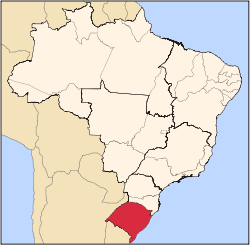
The Brazilian Armed Forces are the unified military forces of the Federative Republic of Brazil. Consisting of three service branches, it comprises the Brazilian Army, the Brazilian Navy and the Brazilian Air Force.

Rio Grande do Sul is a state in the southern region of Brazil. It is the fifth-most populous state and the ninth-largest by area. Located in the southernmost part of the country, Rio Grande do Sul is bordered clockwise by Santa Catarina to the north and northeast, the Atlantic Ocean to the east, the Uruguayan departments of Rocha, Treinta y Tres, Cerro Largo, Rivera, and Artigas to the south and southwest, and the Argentine provinces of Corrientes and Misiones to the west and northwest. The capital and largest city is Porto Alegre. The state has the highest life expectancy in Brazil, and the crime rate is relatively low compared to the Brazilian national average. Despite the high standard of living, unemployment is still high in the state, as of 2017. The state has 5.4% of the Brazilian population and it is responsible for 6.6% of the Brazilian GDP.
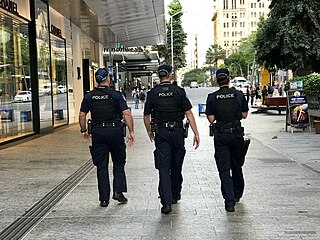
State police, provincial police or regional police are a type of sub-national territorial police force found in nations organized as federations, typically in North America, South Asia, and Oceania. These forces typically have jurisdiction over the relevant sub-national jurisdiction, and may cooperate in law enforcement activities with municipal or national police where either exist.

The Brazilian Army is the branch of the Brazilian Armed Forces responsible, externally, for defending the country in eminently terrestrial operations and, internally, for guaranteeing law, order and the constitutional branches, subordinating itself, in the Federal Government's structure, to the Ministry of Defense, alongside the Brazilian Navy and Air Force. The Military Police and Military Firefighters Corps are legally designated as reserve and auxiliary forces to the army. Its operational arm is called Land Force. It is the largest army in South America and the largest branch of the Armed Forces of Brazil.

Military Police are the uniformed preventive state police of the states and of the Federal District of Brazil. The Military Police units are the main ostensive police force at the state level and are responsible for policing and maintaining the public order. Their formations, rules and uniforms vary depending on the state. Investigative work and forensics are undertaken by the Civil Police of each state.
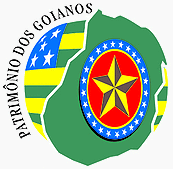
The Military Police of Goiás State are the preventive police force of the state of Goiás. In Brazil, Military Police are reserve and ancillary forces of the Brazilian Army, and part of the System of Public Security and Brazilian Social Protection. Its members are called "State Military" person.

In Brazil, the Federal Constitution establishes eight law enforcement institutions - seven titulars and one auxiliar. The titular institutions are: the Federal Police, the Federal Highway Police, the Federal Railroad Police, the Federal Penal Police, the State Military Police and Fire Brigade, the State Civil Police and the State Penal Police. Of these, the first four are affiliated to federal authorities and the latter three are subordinated to state governments. These public safety institutions are part of the Executive branch of either federal or state government. Apart from these eight institutions, there are others which affiliate to municipal authorities: the Municipal Guards. According to Minister Alexandre de Moraes of the Supreme Federal Court, "...the Municipal Guards are inserted in public safety as the auxiliary and related body of public security force..." Federal law 13,022 gave them de facto and de jure police attributions.

The Revolution of 1930 was an armed insurrection across Brazil that ended the Old Republic. The revolution replaced incumbent president Washington Luís with defeated presidential candidate and revolutionary leader Getúlio Vargas, concluding the political hegemony of a four-decade-old oligarchy and beginning the Vargas Era.
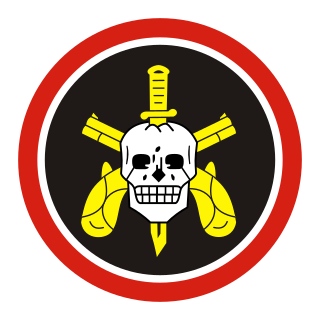
Batalhão de Operações Policiais Especiais (BOPE) is the police tactical unit and gendarmerie of the Military Police of Rio de Janeiro State (PMERJ) in Brazil. Due to the nature of crime in favelas, BOPE units utilize equipment deemed more powerful than traditional civilian law enforcement, and have extensive experience in urban warfare as well as progression in confined and restricted environments.
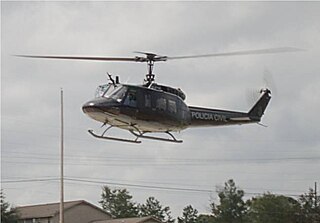
In Brazil, the Civilian Police is the name of the investigative state police forces.
The Southern Military Command is one of eight Military Commands of the Brazilian Army. The Southern Military Command is responsible for the defence of the states of Rio Grande do Sul, Paraná and Santa Catarina.

The Federalist Revolution was a civil war that took place in southern Brazil between 1893 and 1895, fought by the federalists, opponents of Rio Grande do Sul state president, Júlio de Castilhos, seeking greater autonomy for the state, decentralization of power by the newly installed First Brazilian Republic and, arguably, the restoration of the monarchy.
In Brazil, the Military Firefighters Corps are military public security forces, responsible for civil defense, firefighting and search and rescue inside the federative units. Since 1915, it has been a military reserve force and an auxiliary force of the Brazilian Army, also composing the Single System of Public Security. Members of the Military Firefighters Corps, such as the members of the Military Police, are designated as being part of the military of the Federative Units by the Federal Constitution.
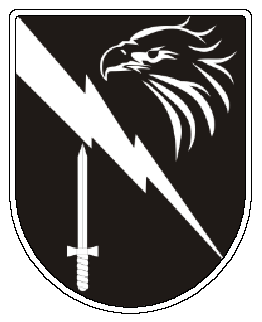
The Battalion of Special Operations is a unit of the Military Police of Paraná, Brazil. It is a police tactical unit in the State of Parana, trained to perform high-risk operations that fall outside of the abilities of regular officers.

Antônio Hamilton Martins Mourão is a Brazilian politician and retired military officer who served as the 25th vice president of Brazil from 2019 to 2022.
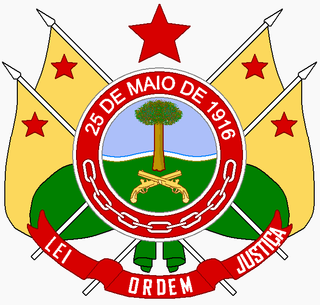
The Military Police of Acre State are the preventive police force of the state of Acre. In Brazil, Military Police are reserve and ancillary forces of the Brazilian Army, and part of the System of Public Security and Brazilian Social Protection. Its members are called "State Military" person.

The Legality Campaign was a civil and military mobilization in 1961 to ensure the inauguration of João Goulart as President of Brazil, overturning the veto of the Armed Forces' ministers to the legal succession of president Jânio Quadros, who had resigned, to then vice president Goulart. It was led by the governor of Rio Grande do Sul, Leonel Brizola, allied with the commander of the 3rd Army, general José Machado Lopes. The crisis resulted in the adoption of parliamentarism as Brazil's new system of government.

The Public Forces of the states of Brazil were already called "small state armies" in the First Brazilian Republic (1889–1930) due to their martial character. They took part in the various struggles and rebellions of the period alongside, and sometimes against, the Brazilian Army. Their character was hybrid, police and warfare. They emerged in the federalism of the First Republic as shields of state power against central power, represented by the Army, and were dismantled by the federal government in the Vargas Era (1930–1945) onwards, losing their conventional warfare capabilities.
Operation Farroupilha was the temporary transfer of the seat of government of the Brazilian state of Rio Grande do Sul from the Piratini Palace in the capital Porto Alegre to a military brigade barracks in Passo Fundo in the northwest of the state. It was planned by Governor Ildo Meneghetti and executed between April 1 and 3, 1964 as part of the coup d'état in Brazil in 1964.

The Rio Grande do Sul Revolt of 1925, also called Revolution of 1925, was triggered by opposition civilians, supported by tenentists, aiming to overthrow the state government of the Brazilian state of Rio Grande do Sul and support the Prestes Column. The revolt was planned by exiles, defeated in the previous 1924 revolt, who still recognized the leadership of general Isidoro Dias Lopes. The plan envisaged uprisings in the army and invasions across the border by groups of exiles.

